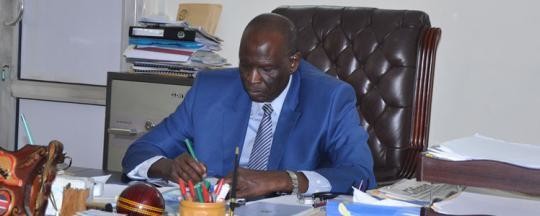Presidential Press Secretary Ateny Wek has defended the Governor of the Bank of South Sudan Kornelio Koryom saying the bank is not responsible for allowing dollars to be sold on the black market at more than five times the official rate.
According to the Bank of South Sudan Act of 2011, the central bank is responsible for regulating foreign exchange dealers including banks, forex bureaus and other financial institutions. The central bank has not allowed official forex points and commercial banks and to raise their rates of sale for dollars even as black market rate has spiked.
During an interview today on Radio Miraya, presidential spokesman Ateny Wek was asked why Salva Kiir removed the Nilepet director-general in response to the fuel crisis but has not taken any action regarding the central bank and the currency crisis.
Ateny replied in part, “If president wants to take decision on anything that people says, who would have taken a decision of even making South Sudan to be anything he wants. But he has wisdom, he does not take a decision when it is not necessary for him to take a decision.”
He stressed, “People shouldn’t see the central bank as the culprit here.”
Radio Miraya’s host pressed the point, saying, “Yes, but people are saying the central bank is letting dollars go to the black market.”
“No, it is not they – they are the custodian of the hard currency and they are the custodian of the money, and the individuals who get money from the central bank take them to the black market because black market it open… so it is not within the control of central bank if individual goes to market and sells their dollars that they have acquired from central bank,” said Ateny.
He added, “There is no magic things there to be done.”
Meanwhile, the the International Monetary Fund (IMF) has criticized the central bank for forcing forex bureaus and commercial banks to sell dollars at an “unrealistic” rate, which discourages them from making dollars available at official points of sale.
In a report last December the IMF recommended better regulation of foreign exchange houses, hinting that some forex bureaus are linked to the black market. IMF noted that the number of banks and forex houses in South Sudan is “excessive” compared to the size of the country’s financial system.
“Generous licensing of new banks and foreign exchange houses pose risks, including of money laundering and illicit transactions, not least because of limited capacity to supervise them,” the IMF reported, urging close regulation of licencees.
IMF’s Executive Board has recommended that South Sudan’s central bank change the official exchange rate. “The reform will eliminate the large transfer of funds from the government to a few beneficiaries and provide reliable and transparent access to foreign exchange for the public and businesses,” reads the IMF’s December report.
File photo: Bank Governor Kornelio Koriom Mayik
Related coverage:
Son of central bank governor involved in currency trading in Juba (7 July)




